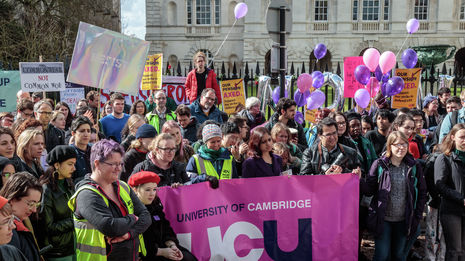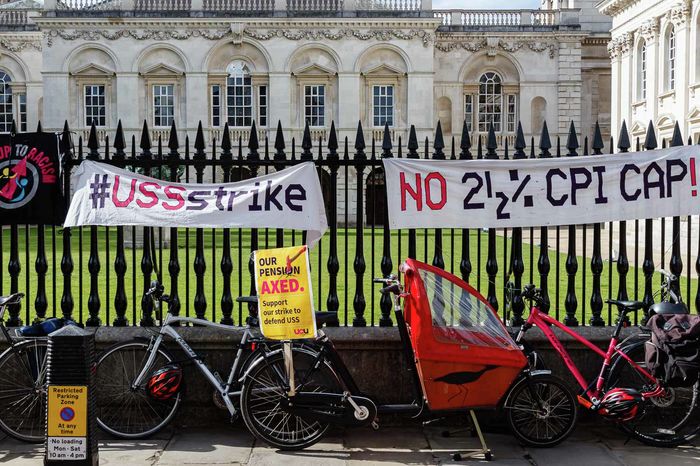UCU calls for more universities to oppose 2020 USS valuation
The University and College Union (UCU) is calling for more universities in the Universities Superannuation Scheme (USS) to oppose the pension scheme’s controversial 2020 valuation

The UCU has called on employers in the Universities Superannuation Scheme (USS) to join them in demanding a new approach to the universities’ pension fund’s 2020 valuation.
The demand comes after two joint letters, one in December (12/12) from Cambridge UCU and the University of Cambridge, and one in January (25/01) from Oxford UCU and the University of Oxford, were sent to Bill Galvin, the USS chief executive, criticising USS’s method of evaluating university staff pensions.
The letters raised “serious concerns” over the fund’s valuation, which saw its technical deficit increasing from £3.6 billion to £23.9 billion by November 2020.
The criticism comes after the USS changed its valuation method for pension schemes in March 2020, which led to reductions in employee benefits for university staff, including less generous pensions.
UCU claim the new method involved “cherry-picked recommendations” implemented by a Joint Expert Panel (JEP) after the extensive university strike action in 2018.
UCU argue that the valuation criteria should reflect the positive long-term prospects of the scheme, and that harsh criteria would discourage UCU members from joining the scheme.
The union is concerned that the relationship between employers and workers is under-appreciated by the USS, and that expectations of higher contributions would price lower-paid members out of the scheme.
Last month, 3,874 people signed a letter of complaint to USS about the valuation.
UCU have asked other universities that are part of USS to join Oxford and Cambridge in demanding a change to the valuation criteria. They have also recommended that more employers collaborate with their local UCU branch to challenge the USS approach.
USS is a pension scheme providing pensions to academics and senior administrative staff at UK universities. It has its headquarters in Liverpool and is one of the UK’s largest pension schemes, but in 2020 the value of its assets fell from £74 billion to £64.3 billion. This, alongside the pension scheme valuation criteria, has prompted much of the recent UCU criticism of the scheme.
Paul Bridge, UCU head of higher education, called the pension evaluation methodology “needlessly cautious”, arguing that “calling for unnecessarily large reductions in benefits and increased member contributions is not the way forward”.
In a press release circulated last week (04/02), UCU general secretary Jo Grady said: “We have no confidence in the approach USS has taken in valuing university staff pension pots and Oxford and Cambridge universities are right to join with their respective UCU branches in raising the alarm.”
She expressed hope that the commitment of two large institutions to the fight against USS’s criteria would encourage them to take criticisms of their pension valuations seriously.
She further commented that: “USS continues to rely on flawed assumptions that underestimate the strength of the scheme and the higher education sector.”
A USS spokesperson stated that they were “committed to engaging with UCU” and their concerns.
In 2019, Trinity College withdrew from USS after advice from consultancy firm PwC regarding its endowment funds. Trinity is a small employer within USS, because the College itself employs only 20 staff who are not also linked to other departments within the University, constituting 0.01% of USS employees.
The majority of Trinity employees remain part of the USS due to their employment by other areas of the university.
Trinity is unique amongst USS members with up to 75% of its assets coming from endowments rather than fees grants. Under USS, the College feared that “in a worst-case scenario” all of the College’s assets “could have been transferred to USS” to help struggling higher education institutions, so took the decision to leave and provide its own pension scheme with similar benefits.
The decision was a controversial one, with over 450 academics pledging to withdraw labour from Trinity at the time.
 News / Colleges charge different rents for the same Castle Street accommodation2 March 2026
News / Colleges charge different rents for the same Castle Street accommodation2 March 2026 News / News in Brief: waterworks, wine woes, and workplace wins 1 March 2026
News / News in Brief: waterworks, wine woes, and workplace wins 1 March 2026 News / Climate activists protest for ‘ethical careers policy’1 March 2026
News / Climate activists protest for ‘ethical careers policy’1 March 2026 News / Angela Merkel among Cambridge honorary degree nominees27 February 2026
News / Angela Merkel among Cambridge honorary degree nominees27 February 2026 News / Private school teacher who lied about Cambridge degree barred from teaching27 February 2026
News / Private school teacher who lied about Cambridge degree barred from teaching27 February 2026









